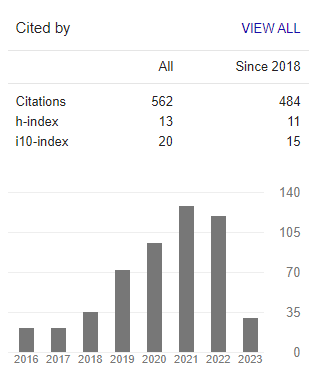THE POLITICS OF GLOBAL RESPONSE TO COVID-19: Implications for the International Communication of Health Care Systems
Abstract
This article analyzes global responses to the outbreak and spread of Covid-19. Specifically, how international communications on the management of Covid-19 by nations and institutions face challenges due to lack of preparedness and capacity of the countries to tackle the virus's spread. Also, how diplomatic relations for cooperation change into conflicts among economic and political rivals in the world. By reviewing selected online news media coverage and social networking sites of public figures and leaders to respond to the epidemics from January-April 2020, this article also draws upon Wallerstein’s world-systems theory as a conceptual framework. The findings indicate that Covid-19 spread at an alarming rate worldwide and contribute to the politicization of global response to and cooperation on Covid-19. The study concludes that Wallerstein’s categorization of the world through the lens of world-systems theory will no more explain the global health care system's nature. Hence, the author suggests a call for Jan N. Pieterse’s critical globalism to improve the health care system's global discourse. Global integration through media discourse would shape communication flows and approaches of cooperation. It also suggested that the world from the core, periphery, and semi-periphery should discuss to tackle the spread of the virus at this time and global environmental crisis in the future.
To cite this article (7th APA style):
Eranfeno, G. N. (2020). The Politics of Global Response to Covid-19: Implications for the International Communication of Health Care Systems. Journal Communication Spectrum: Capturing New Perspectives in Communication, 10(2), xx-xx. http://dx.doi.org/10.36782/jcs.v10i2.2024
Keywords
References
Anjorin, A.A (2020).The Corona virus disease 2019 (COVID-19) pandemic: A review and an update on cases in Africa. Asian Pacific Journal of Tropical Medicine. doi: 10.4103/1995-7645.281612
Appelrouth, S. & Edles, L.D. (2011). Sociological Theory in the Contemporary Era: Text and Readings. Sage Publications Inc.
Binti Hamzah FA, et. al.(2020). Corona Tracker: Worldwide COVID-19 Outbreak Data Analysis and Prediction. [Submitted]. Bull World Health Organ. E-pub: 19 March 2020. doi: hyperlink:"http://dx.doi.org/10.2471/BLT.20.255695" http://dx.doi.org/10.2471/BLT.20.255695
Burhanuddin, A. (2015). Rethinking World System Theory:A Historical and Conceptual Analysis. JURNAL Wanua Jurusan Hubungan Internasional, 1 (1).
Carney, B. B. (2017). Public health emergencies of international concern:global, regional, and local responses to risk. Medical Law Review, 25 (2), 223–239.
Claudia F. Parvanta, D. E. (2011). Essentials of Public Communication. London: Jones & Bartlett Learning.
Debanjan, B. (2011). International communication at the crossroads. Journal of Media and Communication Studies, 3 (7), pp. 231-233.
Glik, D. C. (2007). Risk Communication for Public Health Emergencies. The Annual Review of Public Health, 28, 33-54.
Habibi. R. & Yamin A.E. (2020). Human Rights and Coronavirus: What’s at Stake for Truth, Trust, and Democracy?
Khosla, R. (2019, December 11). Health and Human Rights at a Crossroads. Health and Human Rights Journal .
Kumar, S. C. (2014). Health Inequalities and Infectious Disease Epidemics: A Challenge for Global Health Security. Biosecurity and Bioterrorism: Biodefense Strategy, Practice, and Science, 12 (5), 263-274.
Lee, A. Y. (2008). Internet press freedom and online crisis reporting: The role. In J. H. Xiao, The Social Construction of SARS:Studies of a health communication crisis (pp. 69-92). Amsterdam / Philadelphia: Benjamins Publishing Company.
Louise Gresham, A. R. (2009). Trust Across Borders: Responding to 2009 H1N1. Mary Ann Liebert, Inc.
Manning, P. and Gills, B. K.(ed.).(2011). Andre Gunder Frank and Global Development: Visions, remembrances and explorations. Routledge: London & New York
Milton L. Mueller, B. N. (2007). Democratizing Global Communication? International Journal of Communication, 1, 267-296.
Morse, S. S. (2007). Global Infectious Disease Surveillance and Health Intelligence: Maket Watch. Health Affairs, 26 (4), 1069–1077.
Obijiofer, L. and Hanustch F. (2008). Toward more Holistic Analysis of International Relations. Journal of Global Mass Communication, 1 (1/2), 9-21.
Pieterse, J.N. (2010). Development Theory: Deconstructions/Reconstructions. Sage Publications Inc. Los Angeles. London. New Delhi
Kapiriri, L. &Ross, A. (2018). The Politics of Disease Epidemics: a Comparative Analysis of the SARS, Zika, and Ebola Outbreaks. Global Social Welfare, 7, 33–45.
Schwartz, R. D. (2010). Confronting Global Pandemics: Lessons from China and the U.S. Global Health Governance,, iii (2).
Thussu, D.K. (2000). International communication: continuity and change.London: Arnold.
Refbacks
- There are currently no refbacks.

This work is licensed under a Creative Commons Attribution 3.0 License.
Indexed by:
Archived in:
Listed in:
INTERNATIONAL ASSOCIATION FOR MEDIA AND COMMUNICATION RESEARCH

















